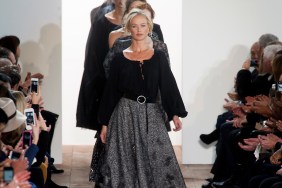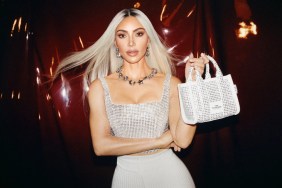We love Marc Jacobs for his reliably diverse runways, his political activism and, of course, his contributions to fashion. However, like many hip designers who draw their influence from “the streets,” Jacobs occasionally lets his white privilege show. Such was the case at his Spring 2017 presentation last night, where Jacobs sent white models like Bella Hadid, Kendall Jenner and Adriana Lima down the runway wearing multicolored wool dreadlocks atop their heads, calling the decision a nod to rave — rather than Rastafarian — culture.
@bellahadid and @kendalljenner backstage at our Spring ’17 show #MJSS17
A photo posted by Marc Jacobs (@marcjacobs) on
Needless to say, Twitter had a lot of questions for the enigmatic designer and his preferred hairstylist, Redken global creative director Guido Palau. Observe:
@marcjacobs So, I guess this means POC can wear our locs freely now and not be blocked from a promotion or job in general?
— Imani Ashante (@dopuhmean) September 15, 2016
why couldn’t marc jacobs hire black models with actual dreads instead of using fake dreads on white people pic.twitter.com/I0weET1cOf
— charl (@basxmxnt) September 15, 2016
An unknown black man/woman has dreads it is assumed they smoke and or are unprofessional. Marc Jacobs has a model with dreads its boho chic
— keikei (@keikei_xo) June 16, 2016
Jenna Rosenstein of Harper’s Bazaar, who caught up with Palau before the show to discuss the models’ stunning (in more ways than one) look, had this to say: “I couldn’t help but wonder how people would react to a hairstyle that holds such an important place in certain cultures. And despite references of club kids and Harajuku girls being thrown around backstage, the issue of cultural appropriation was never mentioned.”
A photo posted by Marc Jacobs (@marcjacobs) on
Palau did not acknowledge the hairstyle’s Rastafarian roots, instead citing transgender director Lana Wachowski — one of the many stars of Marc Jacobs’ Spring 2016 ad campaign — as its muse. “We were also looking at other girls that were inspiring to Marc, and certain types of cultures, like rave culture, club culture, acid house, Boy George and Marilyn,” explained Palau. And where do you think these subcultures found their inspiration, pray tell?
“The interesting thing about Marc is how he takes something so street and so raw, and because of the coloration of the hair and the makeup, it becomes a total look,” Palau continued. “Something that we’ve bypassed on the street and not really looked at, or seen a million times, he makes us look at it again in a much more sophisticated and fashionable way.”
The hair genius’ words are flawed on so many levels. First, rather than veiling his true meaning under the word “street,” Palau should’ve directly acknowledged the influence of black culture. Secondly, the implication that the raw iteration of this hairstyle needs to be toned-down and colored to become “fashionable” and socially accepted is insulting to those who wear their locs as a symbol of black pride or a means of safeguarding their natural hair.
Marc, in response to the social media uproar, had a much more eloquent explanation for his creative choice: “I don’t see color or race — I see people,” the designer commented on Instagram. “I’m sorry to read that so many people are so narrow minded…Love is the answer. Appreciation of all and inspiration from anywhere is a beautiful thing. Think about it.”
@marcjacobs response to cultural appropriation during his @NYFW 16 show. Your thoughts? pic.twitter.com/At4kLj1EGT
— SAFashionBook (@SAFashionBook) September 16, 2016
While cultural exchange is as important to the fashion world as it is to our daily lives, deepening our understanding of the world and spurring innovation and understanding, it’s important to acknowledge that we, unfortunately, do not exist in a colorblind world. If Marc wants to help the rest of the world reach his level of enlightenment, he ought to acknowledge the true origin of the hairstyle — and refrain from likening black women straightening their hair to cultural appropriation. After all, many black women feel they have to straighten their hair — and comb out their dreadlocks — to be taken seriously in a professional setting and/or conform to a white ideal of beauty. And while it is worth noting that several women of color walked Jacobs’ runway, the presence of a naturally-dreaded model would have made a much more powerful statement about acceptance and inclusion than a retaliatory comment on Instagram.
Take in Jacobs’ Spring 2017 show for yourself in the slideshow below and tell us, do see appreciation, appropriation or something in between?
[ via USA Today and Harper’s Bazaar ]
UPDATE 9/20/2016: Three days after his controversial runway show set the Internet aflame, Marc Jacobs took to Instagram to offer a formal apology. See below.
Only time will tell whether the designer truly understands the error of his ways and words or if he simply wished to quiet his critics.
Marc Jacobs Spring 2017
-
Marc Jacobs Spring 2017

-
Marc Jacobs Spring 2017 #2

-
Marc Jacobs Spring 2017 #3

-
Marc Jacobs Spring 2017 #4

-
Marc Jacobs Spring 2017 #5

-
Marc Jacobs Spring 2017 #6

-
Marc Jacobs Spring 2017 #7

-
Marc Jacobs Spring 2017 #8

-
Marc Jacobs Spring 2017 #9

-
Marc Jacobs Spring 2017 #10

-
Marc Jacobs Spring 2017 #11

-
Marc Jacobs Spring 2017 #12

-
Marc Jacobs Spring 2017 #13

-
Marc Jacobs Spring 2017 #14

-
Marc Jacobs Spring 2017 #15

-
Marc Jacobs Spring 2017 #16

-
Marc Jacobs Spring 2017 #17

-
Marc Jacobs Spring 2017 #18

-
Marc Jacobs Spring 2017 #19

-
Marc Jacobs Spring 2017 #20

-
Marc Jacobs Spring 2017 #21

-
Marc Jacobs Spring 2017 #22

-
Marc Jacobs Spring 2017 #23

-
Marc Jacobs Spring 2017 #24

-
Marc Jacobs Spring 2017 #25

-
Marc Jacobs Spring 2017 #26

-
Marc Jacobs Spring 2017 #27

-
Marc Jacobs Spring 2017 #28

-
Marc Jacobs Spring 2017 #29

-
Marc Jacobs Spring 2017 #30

-
Marc Jacobs Spring 2017 #31

-
Marc Jacobs Spring 2017 #32

-
Marc Jacobs Spring 2017 #33

-
Marc Jacobs Spring 2017 #34

-
Marc Jacobs Spring 2017 #35

-
Marc Jacobs Spring 2017 #36

-
Marc Jacobs Spring 2017 #37

-
Marc Jacobs Spring 2017 #38

-
Marc Jacobs Spring 2017 #39

-
Marc Jacobs Spring 2017 #40

-
Marc Jacobs Spring 2017 #41

-
Marc Jacobs Spring 2017 #42

-
Marc Jacobs Spring 2017 #43

-
Jacobs Rs17 4747

-
Marc Jacobs Spring 2017 #45

-
Marc Jacobs Spring 2017 #46

-
Marc Jacobs Spring 2017 #47

-
Marc Jacobs Spring 2017 #48

-
Marc Jacobs Spring 2017 #49

-
Marc Jacobs Spring 2017 #50

-
Marc Jacobs Spring 2017 #51

-
Marc Jacobs Spring 2017 #52

-
Marc Jacobs Spring 2017 #53

-
Marc Jacobs Spring 2017 #54

-
Marc Jacobs Spring 2017 #55









